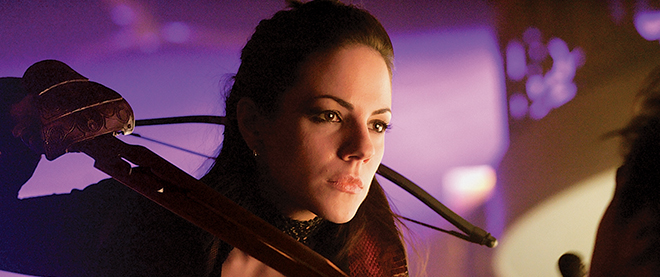Buffy’s sultry Canadian cousin
Fights, werewolves, a heroine whose power is sexiness: no wonder Lost Girl is a hit
LOST GIRL, Anna Silk, (Season 1), 2010-. photo: © Syfy/Showcase TV / Courtesy: Everett Collection
Share

Here’s one kind of television that Canadians may be doing better than Americans: titillating fantasy with lots of fights, stylized sets and people in monster makeup. The show that offers this kind of wildness is Lost Girl, the story of a beautiful succubus (Anna Silk) solving supernatural mysteries that is completing its third season on Showcase and has just been picked up for a fourth. It’s been one of the Canadian channel’s highest-rated shows since it began in 2010, consistently winning its time slot on the Syfy network in the U.S. And instead of a serious genre show, it’s what writer and current showrunner Emily Andras calls “a world of mermaids and werewolves and sex manatees.”
Executive producer Jay Firestone says he started developing the show several years ago when friends pointed out that TV had nothing like Buffy the Vampire Slayer anymore. When he set out with writer-creator Michelle Lovretta to change that, he found that a lot of networks thought the idea of a girl-power fantasy show was “old news. I got one network executive telling me the show was too much like Witchblade, a show that didn’t last.”
Networks wouldn’t have been so dismissive of this kind of show in the ’90s, when the first-run syndication market and a proliferation of cable networks created a demand for low-budget action shows that made up with humour what they lacked in money: Buffy and Xena: Warrior Princess were two of the most popular. But in today’s TV world, science fiction tends to be quite dark and serious, like Battlestar Galactica. “A lot of incredible genre stuff is quite earnest right now,” Andras says, and even shows that could be campy, like The Walking Dead or Game of Thrones, are basically solemn.
While Lost Girl has its serious moments, it is openly campy in a way that modern television doesn’t usually dare to be, starting with the heroine’s power to project an irresistible sexual aura and suck the life out of people with a kiss. The show abounds in references to B movies and cheesy action shows; Firestone singles out an episode where “we did the POV of a spider on a shower rod jumping down at somebody,” and speaks of the heroine’s “MacGyver-type” ability to find makeshift weapons in fight scenes. But instead of being attacked by critics for its cheesiness, it’s earned praise from them, including a rave review from the Huffington Post that helped give it more prominence in the U.S., even as the plots were getting more outlandish. The third season opened with a women-in-prison story which Andras describes as “incredibly winky-winky, going back to the original Caged Heat,” and in which the prison was run by man-hating Amazons. We probably won’t see that on The Walking Dead.
Lost Girl may be a throwback to that earlier type of TV in another way: it uses its silliness as a way of taking on issues without preaching. Just as Buffy was one of the first shows of its era to deal with gay characters matter-of-factly, Lost Girl has become popular for its non-judgmental depiction of the lead character’s bisexuality. Andras says the show’s refusal to label people has attracted “two fan bases: genre people and the LGBT community.” The triangle between the heroine, a female doctor and a handsome wolf man is also an excuse to feature skimpy outfits and what Andras calls “hot ladies doing hot lady stuff,” but in the tradition of the B movies the show is paying homage to, it goes to places respectable shows haven’t gone yet.
If anything is standing in the way of Lost Girl getting more attention, it may be a rival on HBO. True Blood, another sexy show about monsters, premiered earlier, though Tara Ellis, Showcase’s senior director of drama content, points out that “we had been developing this show long before True Blood came out.” In any case, now that True Blood is struggling to find its way after losing two showrunners, Lost Girl may have a chance to get noticed as a leader in sex-drenched fantasy—though Andras says the writers are careful about not doing titillation for its own sake: “The sex has to be part of the story, or serve a purpose.” But, she adds, “you can’t stop a group of college guys from watching it at 3 a.m.”